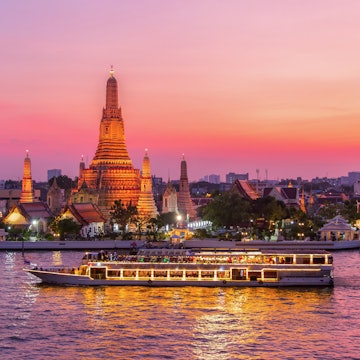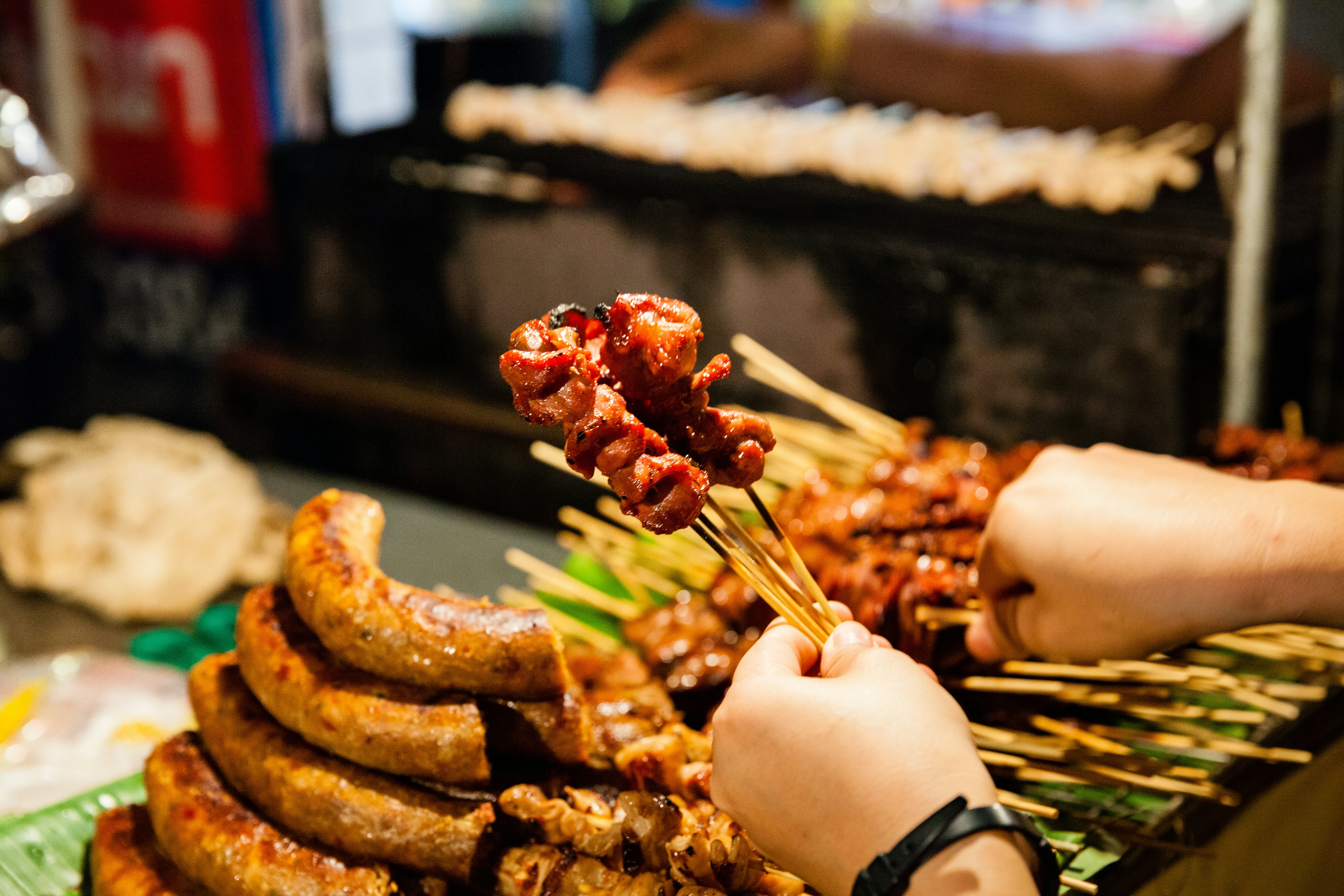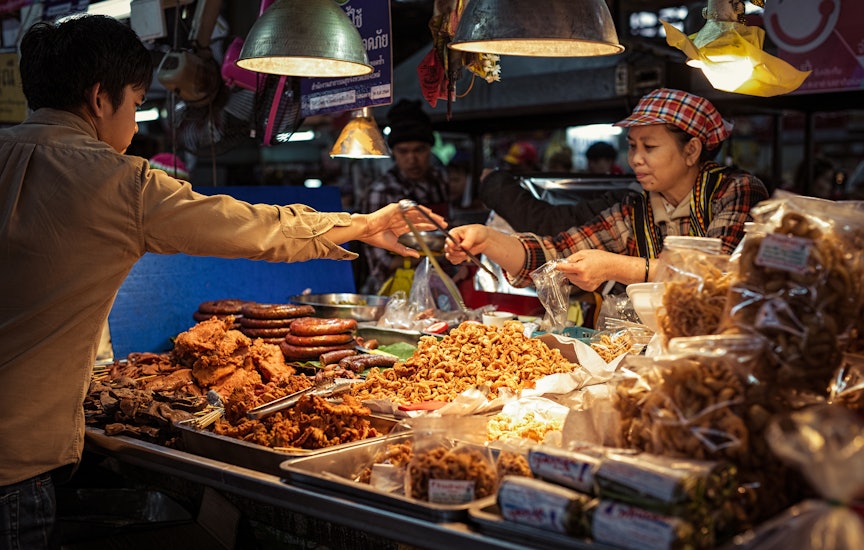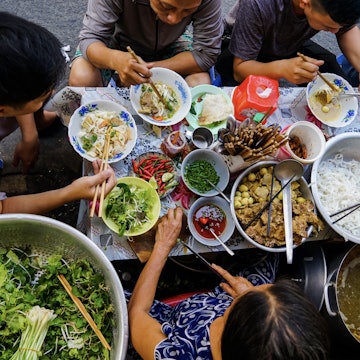

Wat Phra Singh in Chiang Mai. Pikoso.kz/Shutterstock
Generations of backpackers will tell you that Thailand has long been a great destination for travelers on a shoestring. And it’s particularly easy to visit the northern city of Chiang Mai on a budget, even with its swanky luxury scene and five-star hotels.
Perhaps it's the fact that the “Capital in the North” is surrounded by mountains and endless green forests – with no beaches for miles – that keeps accommodation costs down. But it’s not just hostels and hotels that are reasonably priced; there are loads of cheap things to do in Chiang Mai, from devouring delectable street food to indulging in muscle-soothing massages. Here's how to stick to your budget in Chiang Mai.

1. Arrive by train
The Special Express train between Bangkok and Chiang Mai leaves three times a day in both directions, and this scenic route costs just 840B one way, which is usually cheaper than flying. Whether you opt to take the daytime service and watch the towns and hills roll by from your window, or take the night train and sleep all the way there (saving on a night’s accommodation too), it’s a safe, spacious and relaxed way to travel.
2. Use Chiang Mai’s public transport
The main way to get around Chiang Mai cheaply is by flagging one of the red songthaew trucks, which are like large taxis that can fit up to eight people. They will take you to your chosen destination within the city for 40B a ride per person. To avoid any lost-in-translation moments, ask to be dropped at the temple nearest to your destination – these drivers know the temple locations like the back of their hands.

3. Get on your bike
This flat city is very easy to cycle around, so rent a bicycle to avoid taxi fares. It’s a great way to see the center and very cost effective too. Most hotels and hostels have bicycles for hire – some will even loan them to you for free – but, if not, get the Anywheel app. You can get a seven-day pass for 100B (or 50B for one day), which gives you unlimited rides of up to 30 minutes.

4. Eat on the street
Chiang Mai is famous for its incredible street food, and two destinations will see to it that you’re well fed for just a few dollars: Chang Phuak Gate Night Market on the northside of the old city moat, and Chiang Mai Gate Market on the southside, just within the moat. Both markets have countless stalls every night, and it's easy to find skewers of meat, noodle soups, curries and more. Pull up a perch – there are usually some plastic chairs around to sit on – and enjoy.
5. Avoid the fines
If you prefer to rent a motorbike or moped (both are known locally as “motorcy”) then be sure to get an international motorbike license before your arrival in Thailand. If the traffic police find you driving without the correct license – a standard car license isn’t sufficient – you’ll incur a 500B fine. Your insurance also won’t cover any road accidents if you don’t have the correct license, so it pays to be prepared.
6. Local beer is your friend
If you drink alcohol and plan to have a few beverages, don’t be caught out by Thailand’s 100% import duty. Drinking foreign spirits – like your favorites from home – will cost around double what you’d expect to pay due to the taxes. Stick to local beers if you’re drinking; Chang, Leo and Singha are all tasty and refreshing and cost 40–70B (depending on the size) from shops, and around 100B in bars, depending on how fancy your bar of choice is.

7. Be a smart shopper
Chiang Mai is full of vast night markets where you can buy food, clothes and souvenirs – one on Wua Lai St runs every Saturday, and another on Rachadamnoen Rd is open every Sunday evening. The items for sale here may seem cheap, but you'll find the same stuff at the university market (officially called Kad Na Mor Market) for half the price. It's on every night and sells clothes, bags and cute home decor pieces.

8. A hand from the temples
Chiang Mai’s ancient and ornate Buddhist temples are much more than places to visit for prayers. Many temples, like Wat Phra Singh, have jay (vegetarian) restaurants attached or very nearby. Delicious vegetarian versions of local specialities are served here extremely cheaply – Buddhists don’t eat meat on their birthday or on the Buddha’s birthday. A few temples including Wat Samphao also have massage halls, which are not fancy but they're certainly the cheapest Thai massages in the city.
9. Find your zen
Chiang Mai is known for being a spiritual hub; people from across the country make pilgrimages to the city’s Buddhist temples and there are countless meditation and yoga retreats in the surrounding area. If your budget doesn’t extend to a retreat or to classes in one of the many great studios, you can attend the free outdoor yoga classes in Suan Buak Hat park. Run by Yoga in the Park Chiang Mai; the sessions take place daily, depending on the weather.

10. Dive into the music scene
There’s excellent live music across Chiang Mai most nights of the week, with local bars hosting musicians and running free gigs that play everything from jazz to folk to indie. The best spots to head to are North Gate Jazz Co-op, the city’s long-standing, much loved jazz venue; Thapae East, which showcases indie and blues acts and more; or Paapu House, a charming guest house with a large bar that hosts a top live-music program.
11. Aim for the rainy season
Visiting Chiang Mai during the rainy season (May to September) is a smart way to save money as many hotels and hostels offer cheaper rates at this “off-peak” time. The seasonal showers are certainly heavy but rarely last more than a couple of hours and are easy to dodge with the Rain Alarm app. The downpours also make the dense natural surroundings really pop with greens, so it’s a great time to visit the waterfalls and forested temples in and around the city.
12. Book your accommodations outside of the old city
Nothing is too far away in compact and densely populated Chiang Mai – the neighborhoods in the center are all adjoined and close to one another. The old city is fun, but you’re more likely to find bargain rates on hostels and guesthouses outside of the moat. Staying in Wat Ket (over the river) or along Wua Lai St (south of the city center) can keep costs down, and it’s easy to walk, cycle or jump in a songthaew to reach the action.
Daily costs
Hostel room: 200–400B
Basic room for two: 400–800B
Self-catering apartment (including Airbnb): 1000B
Public transport ticket: 40B
Coffee: 50B
Khao soy noodles: 40–100B
60-minute Thai massage: 250B
Dinner for two: 500B
Chang beer at the bar: 80B
Average daily cost: 1000B (covers three meals a day, plus accommodation and a small budget for activities).
















